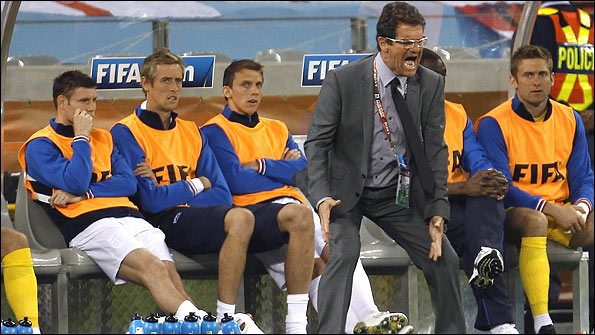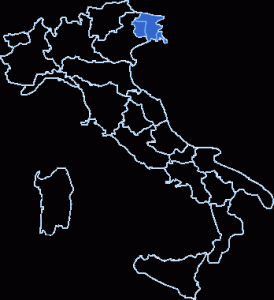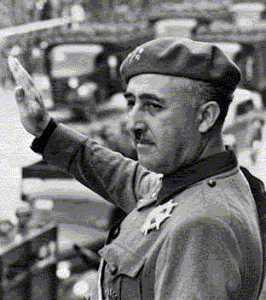Capello’s geographical background
In 1946, one year after the end of the second world war, Fabio Capello was born in the small town of San Canzian d’Isonzo on the border between what is now Slovenia and Italy or what used to be the border between Italy and Yugoslavia. The territory immediately next to where he was born, Trieste, a place very close to my heart, was administered by Britain and the USA right up to 1954 when it was finally handed over to Italy. It was a rural region that still bore the scars of the Second World War and was still full of tension. His father had arrived home after suffering in German prison camps following the Italian army’s withdrawal from its alliance with Germany during the war.
His father’s legacy
“My father conceived me after having been imprisoned in Nazi
concentration camps and Capello insists a hardworking upbringing and the encouragement of his father to pursue his footballing dreams are the roots of his success.
In an article in the Indepdendent in December 2007 this post-war background is described by Cahal Milmo.
” His father played for an Italian third division side and an uncle was so good that he played for the national side. Not only was football in the genes but it also provided an escape from the Cold War pressures in a part of Italy where there was constant fear that the borders could be redrawn and his family forced from their home. Citing the role of his father and uncle in forming his legendary work ethic, Capello said: “They taught me dedication, to always work hard with absolute stubbornness. Only hard work allows an athlete to make the most of his talents.”
Capello’s political allegiance
At the age of 22 he began to follow politics and after starting off voting for the Italian socialist party, he drifted further to the right, eventually switching to extreme right parties Lega Nord and Forza Italia. Many anti-racist groups have accused Lega Nord of “openly embracing racist and fascist” attitudes and Capello has also made no secret of his strong nationalist beliefs.
When he scored for Italy at Wembley in 1973, he dedicated his goal to Italian immigrants who he said were treated like “waiters” by the British. All of this background may be potentially useful in understanding the way in which he approaches his work and the way in which he manages people.
Last night’s debacle against Algeria
Watching the match last night as an Englishman and as somebody who likes to see England do well at football, I had never seen England play as poorly and after the match there was no shortage of reasons given why the performance had been so bad.
An understanding of the way in which the manager works might shed some light on this. His father was a strict disciplinarian as a schoolteacher and much of this has rubbed off on Capello. When he took over as English manager David Beckham, who has played under Capello both at Real Madrid and for England, suggested that the manager’s “scary” personality had been key to England’s rejuvenation. “He’s brought a real seriousness, a professional side which was needed. He scares you – in a ‘respect’ way,” Could it be that this scariness has now become a negative aspect of the way he works with people?
Capello the Disciplinarian
George Cohen, who was in England’s world cup winning team in 1966, sees similarities between Fabio Capello and Alf Ramsey, the England manager of the time. “The more I hear about Capello and the way he runs the England team, the more he reminds me of Sir Alf Ramsey. It might be a different era, but the basic philosophy is very similar. They want control, they are regimented, they demand the highest standards and they do not put up with anything that might cause a distraction.”
I don’t know what the case is now but when he became England manager he decided to call the players by their surnames rather than their first names, and unlike his predecessor McClaren before him never called them by their nicknames. Once he actually said:
“Why should I waste my time listening to people like players, who are clearly less intelligent than me.”
Ruid Gullit, the Dutch football manager who played under Capello at A C Milan, has this to say about him:
“Sexy football? No, I don’t think so. He is about winning, I worked with him for four years and he’s a coach who plays to win. He doesn’t play for the beauty of the game but to win, that’s all. That is the reason he was sent away by Real Madrid. They were winning games but nobody was happy with the style. He won the championship but he still had to go. For him, it’s all about winning, and he knows how to do it.” He describes the Italian as moody and clinical. And the pair have entirely different philosophies about how to play the game.”
“To play for him, you need to be well drilled and very disciplined. You certainly don’t fool around with him. You have to go his way or you will get in trouble. He screams at you. You don’t see him laughing much. He’s very moody.”
He has spoken positively about certain aspects of Franco’s fascist government in Spain:
“In Madrid I breathed a sparkling atmosphere, the air of a country in Europe making the greatest progress. When I returned to Italy it seemed I had taken two steps back. Spain in two words? Latin warmth and creativity regulated by a rigorous order. The order which comes from Franco.”
When reminded that Franco was a dictator, Capello replied: “But he left a legacy of order. In Spain everything works well, there is education, cleanliness, respect. We should follow their example.”
Silvio Berlusconi once observed, “Fabio has one small fault. It is that dialogue forms no part of his approach.” The smartest tactic Capello has employed since he arrived in England has been to exaggerate that quality by extending it to selective difficulty with monologue. Capello promised that he would brush up his English conversation in the month before he took control of his first match. As it was – though he apparently spoke reasonably fluently in private – he did not address the press without an interpreter for six months. Interestingly last night he asked for questions to be translated into Italian.

The strict headmaster on the touchline last night. Is it the players or the manager who is the problem? And on the BBC website this was one of the comments on this photo. "Look at the reaction on the players faces to Capello's frustration !It reminds me of a bad day at Junior School when I was a kid. Multimillion world class superstars scared of the Headmaster.....what a joke!"
Wil the lions, tamed and frightened last night, roar again on Wednesday?
Frank Skinner, co writer of “Three Lions on the Shirt, Football’s coming home” commented last night:
” Do you remember that quote of Kevin Keegan’s about how having the three lions on your chest gives you that extra oomph, and you know, you feel proud and determined to do even better than usual. It’s like these guys have got the three lions on their chest, but it’s the lion from the Wizard of Oz. It was a frightened lion tonight, but maybe the lion will regain his snarl against Slovenia.”
For the lions to snarl again Capello might just have to admit mistakes in the way that England manager Bobby Robson did in the 1986 World Cup in Mexico. If the players don’t perform then maybe you need to look at yourself as a manager to find the reasons for that in the same way that as a teacher if the student’s don’t do what you ask them to do, the first place to look is you yourself as the teacher, were your instructions clear? Did you set up the task properly? The easiest thing to do is to blame the students.
Who does Capello blame?
“It is incredible the mistakes of the players, when they do not control the ball, the easy passes we missed. Everything. This is incredible for the level of the England players. It is the pressure. It is so big that the performance of the players is not as good as I know.” Capello also dismissed the notion, posed by former England boss Graham Taylor, that there might be problems in the training camp. Capello said: “This is incredible. I think we have the best training camp. We are training well together always. The problem is not the training camp. The problem is the players who were so good as a team are not so good as a team at this moment.”
And might it not have something to do with you Fabio Capello?
I know that in the classroom I don’t get the best out of my students if I behave in the authoritarian way that I suspect Capello behaves with the England players. Former England manager Graham Taylor suggested today that Capello does not understand what is needed to relax the players and that he doesn’t understand what it takes to relax a group of English men away from home for a long period of time. If this is the case, is he big enough to change tack in the middle of the campaign? Why was Gerrard played out of position? Why no Joe Cole? Why was there nothing happening on the left? Why were the players so lacking in confidence? These were the questions being asked by millions of football supporters last night.
Capello was given the England job at £6 million a year without any proper open competition and was installed very hastily after the failure to qualify for Euro 2008. It may be that with an early exit from the World Cup that he will be relieved of his post, as they say, with a very handsome pay-off. I just hope that lessons will be learned. It’s only football, I know, but as a way of working with people the characteristics of the Capello regime have been dictatorial management,poor people skills, keeping people in the dark before matches and scapegoating people for failure as with the dropping of poor Rob Green and as such I won’t be sad to see him go. Anybody else feel this way?







